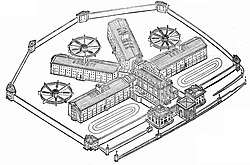Prisoners' rights
The rights of civilian and military prisoners are governed by both national and international law. International conventions include the International Covenant on Civil and Political Rights; the United Nations' Minimum Rules for the Treatment of Prisoners, the European Committee for the Prevention of Torture and Inhuman or Degrading Treatment or Punishment,[1] and the Convention on the Rights of Persons with Disabilities.[2]
| Criminology and penology |
|---|
 |
|
Methods |
|
Schools |
| Rights |
|---|
 |
| Theoretical distinctions |
| Human rights |
| Rights by beneficiary |
| Other groups of rights |
Prison Litigation Reform Act
In the United States, the Prison Litigation Reform Act, or PLRA, is a federal statute enacted in 1996 with the intent of limiting "frivolous lawsuits" by prisoners. Among its provisions, the PLRA requires prisoners to exhaust all possibly executive means of reform before filing for litigation, restricts the normal procedure of having the losing defendant pay legal fees (thus making fewer lawyers willing to represent a prisoner), allows for the courts to dismiss cases as "frivolous" or "malicious", and requires prisoners to pay their court fees up front if they have three previous instances of a case having been dismissed as "frivolous."[3]
See also
- Amnesty International
- Death in custody
- LGBT people in prison
- November Coalition
- Penal Reform International
- Preservation of the Rights of Prisoners (PROP)
- Prisoners' Union
- Prison abolition movement
- Standard Minimum Rules for the Treatment of Prisoners
- Sentencing disparity
- Prisoners' rights in international law
- Prison Strike
- Prisoners' rights in New Zealand
- Prisoner rights in the United States
References
- Howard Davis (2003), "Prisoners' rights", Human rights and civil liberties, Taylor & Francis, p. 157, ISBN 978-1-84392-008-3
- Handbook on prisoners with special needs, pp. 47-48 (published by the United Nations Office on Drugs and Crime)
- Meeropol, R. & Head, I. (2010). Brief summary of the prison litigation reform act (PLRA). The Jailhouse Lawyer's Handbook. Retrieved from http://jailhouselaw.org/brief-summary-prison-litigation-reform-act/
External links
Organizations working for prisoners' rights:
- American Civil Liberties Union on prisoners' rights
- Human Rights Watch
- Amnesty International
- Prison Activist Resource Center
- Lawyer for prisoner And its conditions